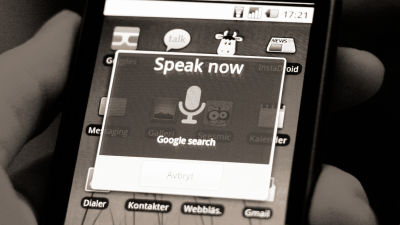What do you agree with "what" when you agree to the Terms of Service of Smart TV?

In addition to being able to operate by voice, smart TV that can browse Netflix and YouTube movies and get information from the Internet is a pioneer of IoT. When using convenient smart television, you are always required to agree to "Terms of Service", users have selected "agree" without thinking deeply, but by using the agreement to this terms of service, The Washington Post reveals by asking legal experts to explain whether they agree or not.
What you really really agreeing to when you accept your smart TV's privacy policy - The Washington Post
https://www.washingtonpost.com/news/the-switch/wp/2017/04/17/what-youre-really-agreeing-to-when-you-accept-your-smart-tvs-privacy-policy/
"To be honest, the article of The Washington Post will start from the fact that there are few people reading smart television's terms of service." I do not read the terms of use and can not say a complaint to what I agreed upon clicking "I agree". Although it sounds easy to point out, it is certain that it is difficult to read small letters displayed on a large screen monitor exceeding 40 inches as a matter of fact.
Privacy experts in Chicago's law firm analyzed the terms of service of smart TVs sold by popular smart television manufacturers in the United States such as Samsung, LG, Vizio, etc., what the user is agreeing with, what kind I will clarify what things can happen and what measures to take. There is little difference between the content of the consent terms of smart television among major TV makers, so we can think that the privacy problem pointed out below is a problem common to all smart TVs.
◆ 1: Audio data
The smart TV has a voice control function, so the user does not need to press a small button on the remote control for operation. The TV maker collects and holds the audio data that the user input to the smart TV because "Improve software and improve operability". However, it is clearly stated that this information will be shared with third parties other than the TV maker, and the user agrees to handle audio data.
For Samsung Terms of Service. "Audio data collected from users may be provided to third parties such as telecommunication companies" and "It collects bidirectional voice commands" is written.
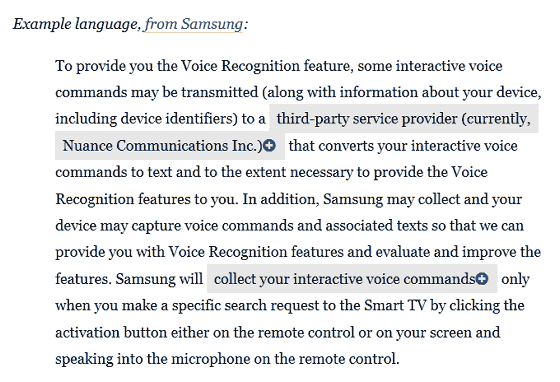
◆ 2: Collecting unexpected data
In the Terms of Use there may be information collected by users unexpectedly. For example, Samsung has items related to "fitness data". As stated below, there are times when you collect user's basic data including 'Height', 'Weight', 'Date of Birth' etc. Of course, these are the information used in incidental services, so it is OK if you agree with the terms of use only if the user wishes.
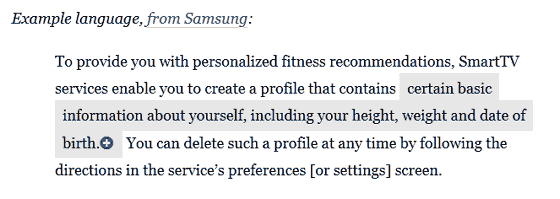
◆ 3: Display based on data
TV makers are watching the information the user is watching and at what timing to enter into the advertisement system. Based on this information, SmartTV has agreed to change the content for each user and display it.
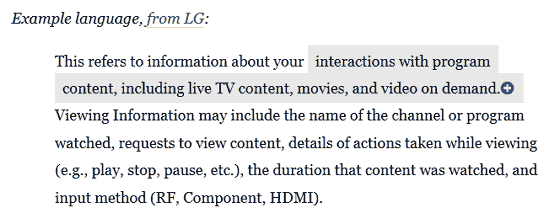
◆ 4: Unexpected user data sharing company
Although TV makers share user data with advertisers and technical partners as described in the section on "1: audio data", this third party (third party partner) includes insurance companies A credit research company is included. TV makers can resell user data to these companies as well.
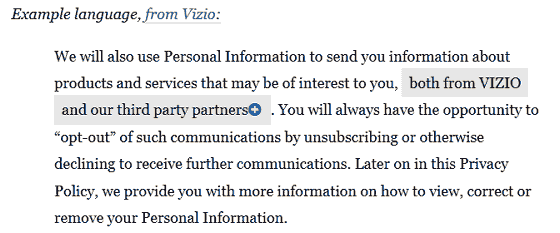
◆ 5: Pitfalls other than smart television
For smart TV, a dedicated smartphone application is provided, and you can extend the function using the application. However, this application is often produced by a company other than the TV maker, and there are separate terms of use in the application itself. In other words, the smart TV's Terms of Service does not include the dedicated application's terms of use, so the user also needs to pay attention to the app's side rule. As described below, Vizio is not responsible for the operation of the application side terms of service by specifying "This service agreement does not apply to the activities of companies and individuals not managed by Vizio".
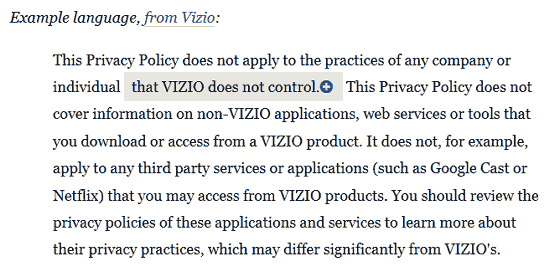
◆ 6: What you do not say "do not do"
Law experts pointed out, "What is not mentioned is important as much as what the TV maker describes in the terms of service." For example, in the case of LG, we only describe the retention period of user information as "only necessary periods", so we do not clarify how long it will be held. In other words, it can be said that it is possible to hold information permanently. The setting keeping function that it does not input information once input is convenient, but it means that if you return the back, information will be kept for a long time.
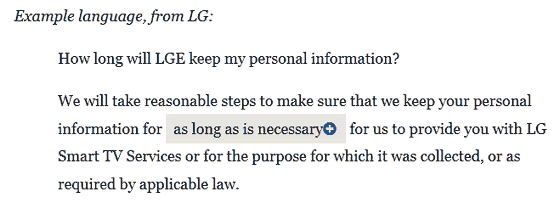
Experts said that one good way to restrict the collection of data is to enable only information related to the functions actually used. It seems that it is possible to reduce the total amount of information gathering even by specifying the information providing target in detail.
Related Posts:

